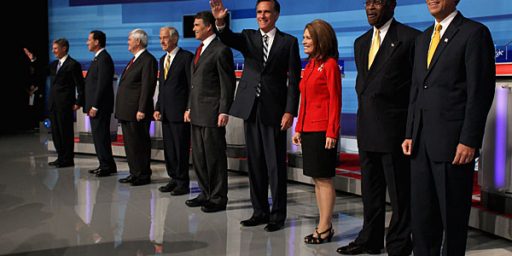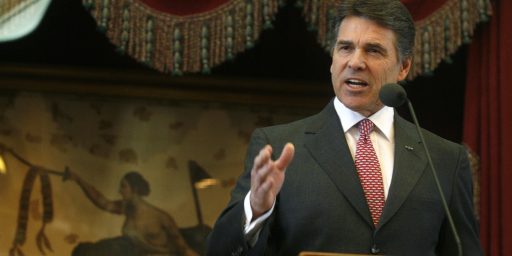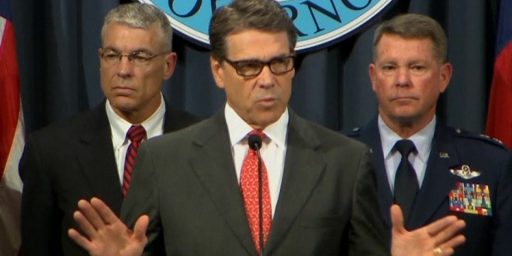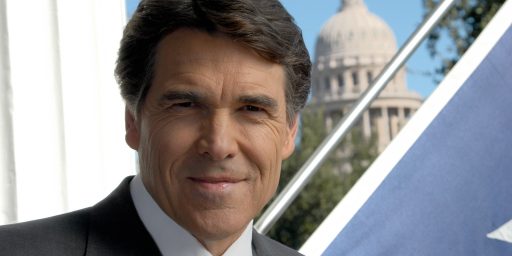Rick Perry Loves the Constitution
Except, of course, the parts he doesn't like.
 Via The Hill‘s Blog Briefing Room: Perry, Huntsman pledge major changes for Congress
Via The Hill‘s Blog Briefing Room: Perry, Huntsman pledge major changes for Congress
During an appearance on Fox News Sunday Perry said he would make “Washington as insignificant as possible” by “getting government out of the way.”
The Lone Star state chief executive said he would “make Congress a part-time institution” modeled after the Iowa legislature. (Perry has launched a bus tour across the state ahead of the January GOP caucuses there.)
By cutting the amount of time members spend in Washington, they would need to “have a real job” and work alongside “real people,” Perry said.
Lawmakers also would spend “less money” and stumble into “less mischief in Washington, D.C.” if Congress was in town less often, Perry said.
First, while sometimes the notion of “getting government out of the way” has merit, blanket statements like this make me think about the story of the fee-for-service fire department in Tennessee.
Second, I am struck by the notion that Perry seems to think that the President of the United States has any say over the amount of time that the US Congress meets (apart from calling special session, which is the opposite of what he is talking about here).
Article I, Section 4, Clause 2 states “The Congress shall assemble at least once in every Year,” and in Article I, Section 5, Clause 4 notes “Neither House, during the Session of Congress, shall, without the Consent of the other, adjourn for more than three days, nor to any other Place than that in which the two Houses shall be sitting.” However, the President is given no say in the matter, save in the case of disputes between the two chambers. The only presidential powers regarding congressional sessions are in Article II, Section 3: ”he may, on extraordinary Occasions, convene both Houses, or either of them, and in Case of Disagreement between them, with Respect to the Time of Adjournment, he may adjourn them to such Time as he shall think proper”. So, he can call a special, additional session, or he can get involved in an adjournment if the two chambers are in disagreement about such.
And, quite frankly, as much as it is easy to pick on Congress, it is pretty clear that the main problem at the moment is not that they do too much, but they don’t do enough (key examples: we still have no budget and no viable long-term spending plan).
To quote AEI’s congressional expert, Norm Ornstein (again):
“The big problem is that members of Congress aren’t spending enough time in Washington. And this current House has the smallest number of days in session in modern memory, and they’ve pretty much pushed a lot of urgent matters, including many of these budgetary matters, off the table.”
Indeed.
Another problematic feature of a part-time congress is that it would enhance the power of the executive, which would alter the relationship of the branches without the constitutional separation of powers system (one which, by the way, was seen by Madison—see Federalist 51,* for example—as a system of legislative, not executive, dominance).
But, fundamentally, it simply isn’t the president’s job to determine the congress’ schedule. And that is a constitutional position.
To round out the headline quoted at the start of the post, Huntsman apparently said that he would work for term limits. This is something that would require a constitutional amendment, and therefore is also outside the scope of the presidency.
On this same general topic, see Doug Mataconis’ post: Rick Perry Declares War On The First Amendment.
It sure would be nice if politicians who rant about the sanctity of the constitution would, you know, actually know what was in the document (as well as what one has to do to change it).
*”In republican government, the legislative authority necessarily predominates.”






He loves the Constitution. He’s just not in love with the Constitution.
The BP spill, Enron, and the Bush Crash are what happens when Government gets out of the way.
All these small Government ideas are based on fantasies…there no historical precedent for any of it.
If radicals like Perry were talking about smarter, more efficient Government then they’d be worth listening to.
@Hey Norm:
Indeed.
There was a time when I thought that that was what the Republican Party stood for. Not only am I retroactively unsure this was the case, but I am sure that it is not the case at the moment.
“Limited government” for someone like Perry seems to mean a combination of abdication of fundamental responsibilities and pure fantasy.
@Steven L. Taylor:
As I noted in my post on the school prayer nonsense, Perry is flailing at this point. He needs to find a breakthrough in one of the January primaries or the logic for his candidacy will finally be dead (I think it is already). He introduced a “government reform plan” that’s basically the same thing as what he said in the article you quoted.
As I said at the time, it’s mostly just a hodge podge of stuff from a campaign that collapsed because of the candidate’s own inadequacies and can’t figure out how to come back.
Yep,
For 2012 nd 2016.
Whoever the Democratic nominee is in 2016, they will slide into office as easily as…Obama will next year.
My prediction of Obama winning by 20-30 million votes is looking more solid each passing day.
I thought this lack of action by government is a Good Thing, according to Libertarian philosophy, right? Weren’t you the people loudly proclaiming how Wonderful gridlock would be, because “nothing would get done!”
Mr Taylor writes: “To round out the headline quoted at the start of the post, Huntsman apparently said that he would work for term limits.”
In the Mataconis Post “North Carolina Governor Calls On Congress To Suspend Elections…Tuesday, September 27, 2011”
I remarked at 19:50: “Isn’t everyone who supports term limits suggesting that the citizens cannot be trusted to pick their leaders…”
My question still stands.
In the Steven L. Taylor Post “Buckets of crazy.” July 29, 2011 I wrote at 19:44:
In the aftermath of the 2010 elections I heard a sentiment oft repeated when the voters give one chamber of the legislature to one party and the other chamber to their opposition.
“Gridlock will good. They won’t be able to do anything.”
Well, this is them not being able to do anything.
Not such a great idea after all it seems!
Grumpy…Stop stealing my material!
@Ernieyeball: I have mixed feeling about term limits, and could make an argument in favor as well as in opposition. (just a quick answer)
Any one else getting the feeling that these Republicans love the Constitution the way a John loves his whore?
@Steven L. Taylor: About 15 miles East of Sleepytown where I live is the little crossroads of Dog Bone. Population 16,xxx and a budget of $13 million. (Chump change I know.)
The voters there have seen fit to elect Robert Butler as Mayor to 12 four year terms since 1963. The only local advocates of term limits are his opponents on election day.
When I ask supporters of term limits how it is that the citizens of Dog Bone are smart enough to elect Mayor Butler to endless terms but should not have been allowed to reelect Paul Simon D IL (State House 1955-63, State Senate 1963-68, Lt. Gov. 1969-73, US House of Rep. 1975-83, US Senate 1983-97) I can’t seem to get anything but a blank stare.
@Ernieyeball: Correction. Paul Simon served in the US Senate from 1985-1997.
I gotta say again. Arbitrary term limits are a restriction on citizens political freedom to choose their representatives as they see fit.
Advocates of term limits for Federal Representatives in Utah (for instance) are not only saying that voters in Utah aren’t smart enough to reelect their own US Senators and US House Representatives. They are saying that electors in the other 49 states are too stupid to vote for their preferred candidate after x terms.
How does the State of Utah get to tell the voters in Maine or Florida or the rest of the country that they can not vote their choice?
Representatives and Senators from Alabama do not represent Utah they work for the inhabitants of Alabama.
@Ernieyeball: No terms limits for the Senate, so I am not sure what your point is (although I am sure there are limits on some of the others).
The basic argument is not the people aren’t smart enough to make choices, it is rather that the power of incumbency can be such that actual democratic competition is compromised. Once the mayor of Dog Bone is fully entrenched in his position running against him could prove highly detrimental to the opponent if said opponent loses, so why try? There is also a question, in general, about the problems of power accumulation and stagnation. Montgomery, AL (for example) had the same mayor for something like 30 years and his was one that led to substantial stagnation in the city’s development.
This is not to say, by the way, that I am an advocate of term limits, per se. I am just trying to address your question since you said it had been hanging out there for a while.
@Hey Norm:
I have to differ with your comparison.
The BP spill, Enron, and the Bush Crash are what happens despite the Government getting in the way. Goverment knew about the BP issues, yet was ineffective. Government agencies new about the Enron stuff and effectively helped pave the way for the Enron issue, had it not been for the government, the Enron debacle could not have happened. And the Bush Crash was/is a directe situation, just like the continuing crash driven by Obama’s administration.
Point Perry is making is that less governmnet incompetence would have lessened or eliminated these kinds of disasters.
Same with the Katrina response. There was so much government involvment (mostly incompetent) nothing could get done.
So, yeah, someone like Perry who wants to lessen goverment incompetence by minimizing involvement (and the expense of that incompetent involvement) he gets my attention in a positive way.
This is little different from Obama saying he’ll hold Congress in session over Christmas if it doesn’t act on legislation he wants. News flash – Congress is a separate and equal branch of government. How can a president (an alleged constitutional scholar, no less) hold open Congress? I guess Obama doesn’t know very much about the Constitution either.
Despite a complete lack of evidence, people keep saying how smart Obama is. I’d love to see some real proof.
@Larry J: “This is little different from Obama saying he’ll hold Congress in session over Christmas if it doesn’t act on legislation he wants. News flash – Congress is a separate and equal branch of government. How can a president (an alleged constitutional scholar, no less) hold open Congress? I guess Obama doesn’t know very much about the Constitution either.”
Actually, Article II, Sect. 3 gives the President the power to convene either or both Houses of Congress in extraordinary circumstances.
Mr. Taylor,
Most citizens I hear advocating term limits want them for US Senate and US House members.
I take this to mean that some inhabitants of my State (Illinois) want to limit the voters choices for US Senate and US House from Kentucky or Colorado.
Term limits also create “Lame Duck” terms (I love the image that conjures up). If an office holder knows that they do not have to face voters again they are responsible to no one.
I would have to say one of the more famous opponents of US Presidential term limits was President Ronald Reagan. http://www.nytimes.com/1987/11/29/us/reagan-wants-end-of-two-term-limit.html
Sorry to hear about Montgomery, Alabama.
As for Dog Bone (Marion IL) the Chamber of Commerce cites something called Economic Development Intelligence System and notes Per Cap. Income growth of 16.6% and Median Family Income growth of 11.1% from 2000 to 2010.
Could be that the all the development on the west side of town out by the Interstate in the past 50 years was independent of Mayor Butler’s tenure. The Super Slab has stimulated growth in all 50 States.
Butler has been opposed several times. Most recently in 2007 and in the 2011 primary.
@Ernieyeball: I am trying to explain, not advocate.
The fact that the Bush admin worked long and hard to make it ineffective may have something to do with that.
Mr. Taylor,
I get that.
I am not a professional writer (no big surprise there to anyone who reads my posts).
My ex-wife was in Law School when I met her. She said one exercise Law students learn is to take a case and argue both sides. As hard as I try my success at this practice is limited.
As for term limits I agree the conflict between the exercise of political freedom and the “power of incumbency can be such that actual democratic competition is compromised.” is a real problem…but not in every case.
Should all voters in all jurisdictions give up their choice because some voters in some places let incumbents run amok?
I do think the Civil Rights Act and the Voting Rights Acts that forced local governments to end discrimination against Black citizens were good for the country.
Maybe this type of Federal legislation is needed to curb “the power of incumbency”.
Personally I hope not.